Reply To:
Name - Reply Comment
Last Updated : 2024-04-17 02:11:00
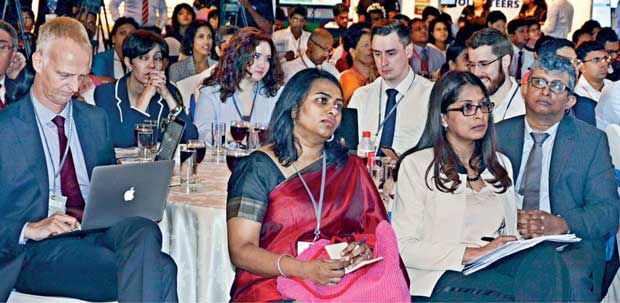
By Shabiya Ali Ahlam
Be it the current, the previous, or the regimes before that, Sri Lanka has always aspired to do great thing. The island nation certainly does not fall short in thinking big and conceptualising ambitious goals but what could be highlighted as a possible challenge in realising such would be the lack of innovativeness in the efforts.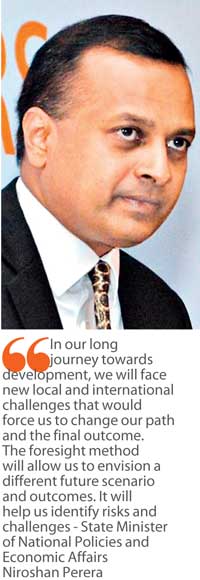
While we do see commitment in wanting to do things differently to achieve what probably could not have been achieved before, many bottlenecks still prevail in the country’s economic environment that slow down any initiative or effort.
In a bid to allow Sri Lanka to move towards a system of futuristic thinking that will complement development planning practices, policy makers and key stakeholders yesterday received fine insights on the concept of foresight and innovation.
The forum, organised by the United Nations Development Programme (UNDP) and the Ministry of National Policies and Economic Affairs, is expected to start a national dialogue on the importance of foresight and innovation as a value addition to traditional development planning to achieve sustainable human development and the 2030 development agenda.
Need for paradigm shift
In recent years, we are seeing a world that is increasingly ‘real time’ and where the use of information and communications technologies (ICT) has become increasingly widespread. The use of ICT has not only resulted in improvements in economic productivity but has had a crucial impact on governments looking to provide more citizen friendly, transparent and accountable, people-oriented public services.
“It is important to note that governments can play a key role in fostering a conducive environment for innovation, helping to overcome certain barriers to innovative practices, and in ensuring that innovation contributes to key goals of public policy,” stressed UNDP Sri Lanka Resident Representative Peter Batchelor.
He added that having recognized the need to catalyze innovation, many governments in the Asia-Pacific region at national and sub-national levels are increasingly investing in various instruments such as innovation labs, teams, and funds to embed innovation as an approach within government and innovative thinking in design and provision of services.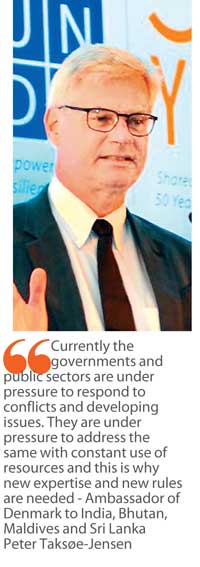
However, despite these pioneering initiatives on innovation by many governments, constraints remain in finding the necessary “space, frameworks and capacity” to take the innovation agenda forward. Which according to the UN representative is to be able to engage citizens, academia, the NGO Sector and other partners including the private sector to co-design innovative ideas? Ideas that benefit from the knowledge of the local context; transforms processes, skills and culture of government, and develop pathways to ultimately achieve wider policy and systems change that affects impact at scale.
Areas to focus
While a safe-to-fail space to prototype various methodologies for development programmes requires transforming the bureaucratic culture and rejecting the business-as-usual scenario, research has shown that the lack of agility, ineffective and untimely communications as well as miscommunications, the absence of a defined framework for exploring new ideas, and rewarding the status quo are often cited as challenges to driving innovation in development.
“It is clear that the build-up of innovation capacities has played a central role in the growth dynamics of successful developing countries, such as Singapore, and Malaysia,” noted Batchelor.
He emphasised that these countries have stood out largely due to having recognized that innovation is not just about high-technology products or a one-time project, but rather requires a shift in thinking, a disciplined approach, strong leadership and a collective commitment to ensure the sustainability of tested innovative ideas.
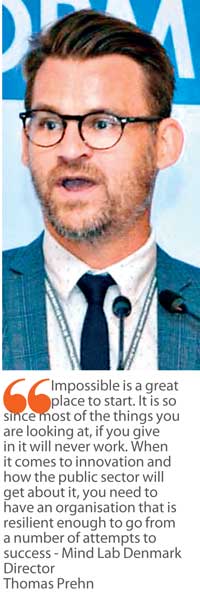
Looking at alternative futures
While the Sustainable Development Goals (SDGs) are not legally binding, governments are expected to take ownership and establish national framework to ensure the realisation of the set targets. Government of Malaysia, MyForesight Director Rushdi Abdul Rahim while highlighting efforts of his country pointed out that forward looking Malaysia has in fact already been successful in embedding the SDGs into its national development plans. The effort was realised only after conducting series of discussions at every levels and translating it into actionably plans and initiatives. Rahim expressed confidence in Sri Lanka threading along a similar path.
As the world is changing at a rapid pace were we are already talking about the fourth industry revolution, Rahim asserted that such will disrupt almost every industry in every country.
“The breadth and depth of these changes will transform the entire system of how you produce, manage and govern. Therefore those who can anticipate, plan and respond to these changes are the most likely to succeed. Hence the need for foresight,” asserted the Malaysian official.
What makes foresight compelling?
Making foresight more compelling is that it is all about the mind-set. To witness different results it is imperative for policy males to think differently about the future by exploring possible and alternative futures. “Without change of mind-set, whatever you do is of no use. The change in mind set along with increased participation and engagement is what will take you forward,” advised Rahim.
While it is also about the changes of processes and methods that will help the realisation of the set objective and goals, it has emphasised that foresight is ‘the’ platform for innovation.
“It gives insights for potential futures, as well as alterative futures. Futures that we want, futures that we need, and also futures that we want to avoid. In understanding what lays ahead, foresight typically allows us to identify opportunities and risks, leading the way to innovate and capitalise on opportunities, while minimise causalities, and nullify the threats,” elaborated Rahim.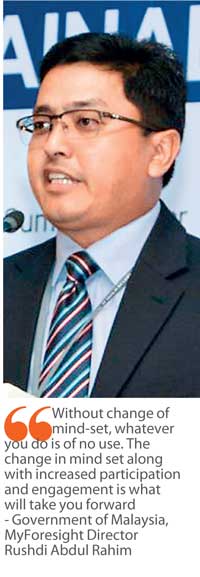
Stressing the need and importance of exploring the future that is available to a nation, it was said to differentiate the alternative futures is a must. That is to differentiate between the needs and wants, which would allow policy makers to prioritise what is required.
“Though I have often told between the future that we want and need, I beg to differ. The future that we want would be a target, and it will help us attain the minimum positive development that we want for ourselves taking into consideration the assessment of policies,” he added.
Having provided a snapshot of the development strategies of Malaysia, Rahim noted that a country cannot rise only with the working levels of its capital economy as a government’s growth is not only measured by the economic success alone, but by the wellbeing of the people and its commitment to be inclusive.
“Plans must be drafted keeping people in the centrepiece for all development efforts,” he asserted.
Why should public sector focus on innovation?
As the public sector is under immense pressure, largely due to globalisation, competition, and frequent environmental threats, the need for governments to find new ways of working is greater now than ever.
Noting that the public sector is perfectly designed for administration and reconciliation, Mind Lab Denmark Director Thomas Prehn said that in the current context the call is for something completely different.
“It calls for different approaches, mind-set, new ways of thinking, and new ways of processing within the public sector,” said the Prehn so is part of a government institution that sees itself as a crucial research and development unit that explores public sector reforms through experiments, original thinking and approaches.
Taking government work to a whole new level, Mind Lab recently set up a public working group that includes diverse segments, and is completely detached from the original organisation. The objective is to build policies in 14 days from scratch, moving to second generation policies that have been tested in the economic environment with real citizens.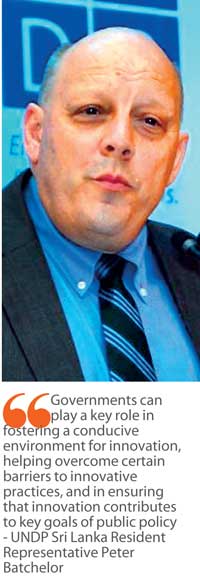
According to Prehn, the initiative is a new way of creating policy, accelerating the speed of the process by detaching it from the original system.
“Impossible is a great place to start. It is so since most of the things you are looking at, if you give in it will never work. When it comes to innovation and how the public sector will get about it, you need to have an organisation that is resilient enough to go from a number of attempts to success,” he said.
Reflecting from the success of Mind Lab, which is the world’s first innovation lab, Prehn asserted that failure should be not looked at as missed opportunities but as attempts.
“What you really need is an organisation that honours these attempts. Prototyping is a very important part if innovation and is a difficult discipline within the public organisation.”
Furthermore, according to him the most important element in innovation in public sector is to have the support from top level. “You need to move from the traditional thinking for innovation to materialise,” he stressed.
Pioneering change
As reiterated time and again, job opportunities for millions of young people across Asia and Europe is crucial for stability in our societies.
Attempting to paint what the scenario would be like when the new technological age further transforms, Ambassador of Denmark to India, Bhutan, Maldives and Sri Lanka Peter Taksøe-Jensen cautioned it will alter value chains, business models, the internet of thing, and most importantly all sectors of economic activities.
“Unlike the last industrial revolution it will note create million manufacturing jobs. But if we harness the right set of skills, opportunities, the key for it will be foresight and innovation,” said Jensen.
He added that for Denmark, investing in skills, managing innovation and long term change is one of the most important agenda as it is imperative to be aware as to what resources should be employed and how.
“Those insights are imperative to deliver innovation led growth. Currently the governments and public sectors are under pressure to respond to conflicts and developing issues. They are under pressure to address the same with constant use of resources and this is why new expertise and new rules are needed,” stressed the envoy.
Due to its pioneering efforts, Denmark ranks second in the EU Innovation scorecard and is recognised and leaders in innovation around the world. The country also ranks high in the happiness index, easy of doing business index, and are amongst the least corrupt countries in the world.
According to Jensen, Denmark ranks high largely due to government efficiencies, transparent and efficient regulatory climate, and its efforts in providing benefits for the unemployed, sick and retired.
Noting it is foresight and innovation that has allowed Denmark to boast the prosperity it currently enjoys, he pointed out the country has a long tradition of public private partnership.
It is through this collaboration the public sector has been successful in not only securing higher personal freedom for its citizens but also in creating a favourable business climate, which intron has created a profound impact on the economic and innovative performance of businesses.
“In the knowledge economy it is not enough to invest in infrastructure which expands corruption. It is forever more critical to direct public resource into catalysing innovation and developing right technical skills.”
He added that for Denmark, knowledge and knowhow is the most important raw materials fir competition or collaborating with other nations around the world. For many years there has been a strong political consensus for the importance of education for the development of society in that country.
“The government (Denmark) has developed a national innovation strategy and has established a politically independent body that does research and development projects for the benefits of the society. We have seen enormous change in the developing nations and innovation will be key to achieve sustainable work for our citizens,” stressed Jensen.
Planning the future of Sri Lanka
Highlighting Sri Lanka’s keenness in embracing change, State Minister of National Policies and Economic Affairs Niroshan Perera said the nation opting for an inclusive approach in reaching its medium term goals, such as creating one million jobs, a stronger middle class, and promoting the nation to become a middle income economy reaffirms the commitment in tying the development goals to UN’s SDGs.
Pointing out that the implementation of the 2030 agenda into Sri Lanka’s national development framework is vital, he stated that the priority is to ensure a more holistic and sustainable economic environment where key focus is on poverty alleviation, achieving food and energy security, improving education, minimising income disparities, and urban development.
“I believe Sri Lanka has a favourable and stable political leadership, human and economic potential to carry out the 2030 agenda successfully. Nevertheless, Sri Lanka has missed several opportunities in the past that would have taken us into a vibrant and sustainable economy. We should ensure that our current path towards economic prosperity is resilient against the global and local talent,” noted Perera.
Noting that adverse climate condition has challenged the core of the systems, in overcoming these challenges, foresight and innovation can be used as an effective tool in policy formation, he said confidently.
“In our long journey towards development, we will face new local and international challenges that would force us to change our path and the final outcome. The foresight method will allow us to envision a different future scenario and outcomes. It will help us identify risks and challenges,”
Perera noted that if Sri Lanka is to build an economy with a competitive export sector, technological and demand driven innovation is essential. He opined that a leap forward in the area of innovation and foresight will put the nation on par with the rest of the world.
“If not will always lag behind in production capacity,” he cautioned.
The minister expressed willing in collaborating with the UN to establish a laboratory for policy development which will function as an entity where innovative solution would be conceptualised to enhance the delivery of public services.
Pix by Samantha Perera

Add comment
Comments will be edited (grammar, spelling and slang) and authorized at the discretion of Daily Mirror online. The website also has the right not to publish selected comments.
Reply To:
Name - Reply Comment
On March 26, a couple arriving from Thailand was arrested with 88 live animal
According to villagers from Naula-Moragolla out of 105 families 80 can afford
Is the situation in Sri Lanka so grim that locals harbour hope that they coul
A recent post on social media revealed that three purple-faced langurs near t